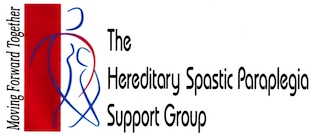Hereditary Spastic Paraplegia (HSP)

Hereditary Spastic Paraplegia overview
Hereditary Spastic Paraplegia (HSP) is a diagnosis that covers a range of rare genetic disorders cased by one or more gene mutations. At present there are over 80 different types of HSP, with the gene mutation known for many of the types.
It is a condition of the upper motor neurons, which causes spasticity (muscle stiffness) and paraplegia (paralysis) of the lower limbs. Typically, those with HSP will have mobility issues caused by progressive spasticity and/or weakness of the leg and hip muscles. This can range from very mild ‘clumsiness’ e.g. trips and falls, through to a severe loss of mobility.
In the majority of cases it affects people from the hips downward, though there are some cases where the upper body is also affected. It can also involve internal organs, though this is mostly limited to the lower body. It is common that the bladder is affected, and the bowel and reproductive systems too. It typically has a slow progression, and in some cases the progression will stop. The rate of progression depends on many factors, even within families with the same gene mutation. The progression will vary in speed and scope from one person to the next.
It is a cousin to Motor Neuron Disease (MND) and commonly misdiagnosed as Cerebal Palsy (CP) - due to issues with walking and muscle tone. It also shares common symptoms with Multiple Sclerosis (MS) and other neurological conditions.
People of all age groups can have HSP, though some types may be more predominant in childhood or adulthood. Onset can be at any age and any similarity with family members can not be assumed. Some people may eventually need to use a walking stick or a wheelchair to help them get around. Others may not need to use any type of mobility equipment. For those with uncomplicated HSP, the condition has little or no effect on life expectancy.


HSP - origin of the name
HSP has a number of different names, but we have adopted Hereditary Spastic Paraplegia for our group as it seems the most relevant:
Hereditary – as it is often caused by a gene mutation that is passed down through the generations
Spastic – because the main symptoms are stiffness (spasticity) in the lower limbs
Paraplegia – because in some, the condition will lead to paralysis in the lower limbs.
Synonyms of Hereditary Spastic Paraplegia also include
- Familial Spastic Paraplegia (FSP)
- Hereditary Spastic Paraparesis
- Familial Spastic Paraparesis
- Spastic Spinal Familial Paraplegia
- Strumpell Disease
- Strumpell-Lorrain Familial Spasmodic Paraplegia
- Strumpell-Lorrain Syndrome
- Strumpell’s Familial Paraplegia
If you are diagnosed with one of these terms, it is all part and parcel of the same condition. Some medical professionals may favour one term over another, but the treatment and prognosis of the condition will remain the same. Some specific types of HSP have their own name, including Silver Syndrome, Troyer Syndrome and MASA Syndrome.
